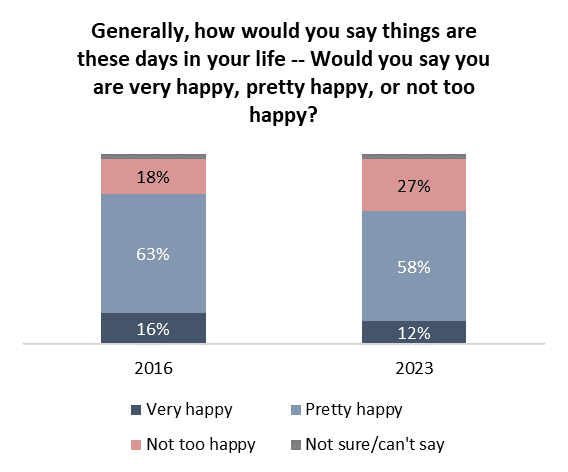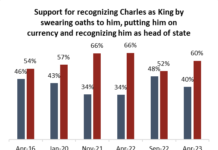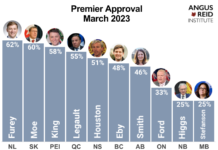AS Canadians load their plates with post-Christmas leftovers and reflect on a year almost over, new data from the non-profit Angus Reid Institute finds 2023 receiving mixed reviews.
Considering factors such as their health, happiness and financial situation two-in-five Canadians say the year was more good than bad for them, with one-third saying it was average, and one-quarter more negative than positive about the last 12 months.
On the financial wellbeing front, however, Canadians are – as they have expressed to ARI throughout the year – in a darker place.
While the majority say they’re satisfied with this aspect of life, fully two-in-five say they are not. More than half of those with household incomes lower than $50,000 join the latter group, who hope that 2024 will bring more prosperity.
Using an additive score, ARI created four groups along a Life Satisfaction Index. These include the Very Satisfied (24%), Satisfied (25%), Dissatisfied (28%) and Very Dissatisfied (23%). There are important variations in who comprises which of these groups.
Consider that among visible minorities in Canada, 65 per cent are either Dissatisfied or Very Dissatisfied overall. Comparatively, for non-visible minorities this proportion is a much smaller 48 per cent.
Those who have kids in their household are more also likely to be on the dissatisfied side of this equation as well (59%) compared to those without children (48%). Some of this is attributable to the role that income and age play in satisfaction with leisure, finances, and other aspects of life. Canadians over the age of 54 tend to be most satisfied with their lives, both men and women.
When it comes to Canadians’ mental health, one-in-three (32%) say they’re dissatisfied with how they feel currently. Young women are most likely to feel their mental health could be better – nearly half (45%) say this.
Comparing some of these data to responses from 2016 when the Angus Reid Institute last asked, there are notable trends. The first is that happiness levels have dropped slightly among the population. Seven years ago, before COVID-19 had spread about the globe and when the economic climate was more stable, four-in-five (79%) said they were either “very” or “pretty” happy. In 2023 that proportion has dropped to 70 per cent, with a nine-point increase in those saying they’re “not too happy” with their life.
The proportion satisfied with their stress levels has also dropped five points over this period, though there is one improvement worth noting. There has been a five-point increase in Canadians self-reported satisfaction with their love life, from 64 to 69 per cent.
What this leads to is a population divided in how they would describe their year. The two most chosen words are grateful (37%) and exhausting (37%). As one might expect, how Canadians describe their year largely depends on where they find themselves on the Life Satisfaction Index.













